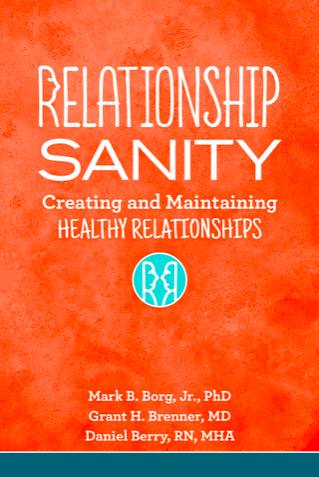Relationship Sanity: Creating and Maintaining Healthy Relationships
Mark B. Borg, Jr. PhD; Grant H. Brenner MD; Daniel Berry RN MHA
People in resilient relationships are co-owners, experience reciprocity, and are better prepared to meet challenges authentically and effectively. In this sequel to the best-selling Irrelationship, the authors use examples from their clinical practice to review the concept of irrelationship and expand the DREAM Sequence, a tool used by affected couples to address perennial relationship issues.
By mutually and mindfully viewing the relationship as a third entity, separate from each individual, couples will learn how to live in and with the ambiguity of empathy, intimacy, vulnerability, and emotional investment and view relationship sanity as a deliberate and joyful undertaking to maintain and deepen connection.
THE IRRELATIONSHIP SERIES
About the Authors
Who we are
The Irrelationship Group LLC was founded to assist people in developing fulfilling intimate relationships through education, self-help, and facilitation. TIG was started by three healthcare professionals in order to assist people in understanding themselves by understanding how they become engaged in dysfunctional relationships, termed "irrelationship". We offer approaches to disentangle oneself from irrelationship through the cultivation of compassionate empathy, mutuality and self-awareness.
Mark B. Borg, Jr., Ph.D. is a community and clinical psychologist and a psychoanalyst practicing in New York City. He is founding partner of The Community Consulting Group, a consulting firm that trains community stakeholders, local governments and other organizations to use psychoanalytic techniques in community rebuilding and revitalization. He is a supervisor of psychotherapy at the William Alanson White Institute and has written extensively about the intersection of psychoanalysis and community crisis intervention. He has published numerous articles and book chapters on community intervention, organizational consultation, psychoanalytic therapy; and on the application of psychoanalytic theory and technique to improve and streamline the process of community crisis intervention.
Grant H. Brenner, MD is a psychiatrist in private practice in New York City, specializing in treating mood and anxiety disorders and the complex problems arising from developmental childhood trauma. He works from a humanistic and integrative perspective, incorporating evidence-based approaches as well as innovative techniques such as transcranial magnetic stimulation (TMS) and neurofeedback. He is on the faculty of the Mount Sinai Beth Israel Hospital, Director of Trauma Service at the William Alanson White Institute and a volunteer and Board member of the not-for-profit Disaster Psychiatry Outreach. He is an author and editor of the book Creating Spiritual and Psychological Resilience: Integrating Care in Disaster Relief Work, and has published a number of book chapters and papers.
Daniel Berry, RN, MHA has practiced as a Registered Nurse in New York City since 1987. Working in in-patient, home care and community settings, his work has taken him into some of the city’s most privileged households as well as some of its most underserved and dangerous public housing projects in Manhattan and the South Bronx. He is currently Assistant Director of Nursing for Risk Management at a public facility serving homeless and undocumented victims of street violence, addiction and traumatic injuries. In 2015 he was invited to serve as a nurse consultant to a United Nations-certified NGO in Afghanistan that promotes community development and addresses women’s and children’s health issues.
What is an irrelationship?
An irrelationship is a two-person psychological defense system; it is a defense against the fear and anxiety that come along with allowing another person to matter. Irrelationship is a way of protecting those within it from the messy business of really relating, because while intimate connections promise caring, compassion, and empathy, they also require emotional investment and risk. Irrelationship is not a syndrome, an illness, or a pathology. It is a way of being in relationship, a dynamic—something partners do together.




